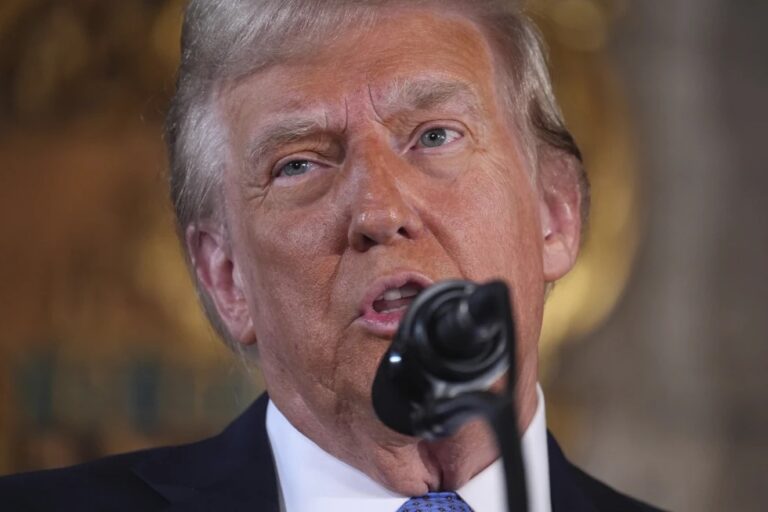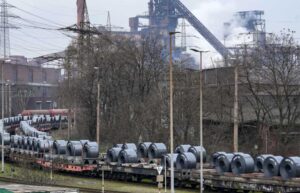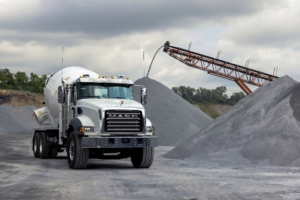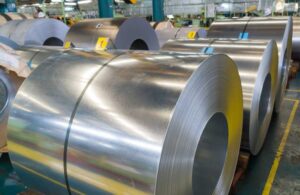DETROIT (AP) — President Donald Trump’s tariffs on steel imports this week could wreak havoc on American auto manufacturing, industry leaders say. The moves align with the Trump administration’s aggressive global trade agenda and ambitions to strengthen U.S. industry, but they could have an inverse effect.
On March 12, all steel imports will be taxed at a minimum of 25%, the result of two orders the president signed Monday that also include a 25% tariff on aluminum. That could have a serious impact on domestic auto companies including Ford, GM and Stellantis — and make these companies’ vehicles more expensive for the nation’s car buyers.
Tariffs on crucial products coming from outside of the U.S. places pressure on domestic sourcing of the materials, experts say. The basic rules of supply and demand could drive up costs.
“Steel producers have to find ways to increase capacity, and aluminum and steel might be in short supply in the short term,” said Sam Fiorani, analyst at AutoForecast Solutions, which studies the industry. “Producing vehicles has a lot of moving parts, and raising the price of what is among the most important components of the vehicle is only going to raise the price of an already expensive product.”
The average transaction price for a new vehicle in the U.S. in January was $48,641, according to auto-buying resource Kelley Blue Book — a hefty investment for an inflation-sensitive consumer.
“Tariffs such as these do nothing to enhance the automotive industry directly,” Fiorani said.
To Ford CEO Jim Farley, Trump’s early actions in office — which also include 25% tariffs on goods coming from Mexico and Canada, although delayed by a month — are already challenging the Dearborn, Michigan, automaker.
The Trump administration has also upended electric vehicle policy put in place under former President Joe Biden, targeted EV charging infrastructure, as well as directed review of vehicle emissions and fuel economy rules — all of which could play a role in automaker plans to decarbonize. Already, auto companies have pulled back some electrification plans amid shifts in the market.
Most of the three automakers’ steel and aluminum already comes from North America, Ford included; CFO Sherry House noted Tuesday during a Wolfe Research conference that 90% of the company’s steel comes from the U.S., and that aluminum is also not that competitive.
Still, Farley said Tuesday during the same conference that “So far what we’re seeing is a lot of cost, and a lot of chaos,” according to a transcript of the event.
Farley said: “The reality is, though, our suppliers have international sources for aluminum steel. So that price will come through and it may be a speculative part in the market where price would come up because the tariffs are even rumored.”
A spokesperson for Ford deferred to Farley’s comments when reached for additional comment. A spokesperson for Stellantis declined to comment.
A GM spokesperson deferred to CEO Mary Barra’s comments from the Wolfe conference. Barra also said much of the steel and aluminum used in GM’s U.S. vehicle production is sourced here and that the company did not expect any significant immediate impact.
“We’re concerned about the downstream effects on consumer products like automobiles,” said Glenn Stevens Jr., executive director of MichAuto, a state auto industry association. “The concern whenever you have a scenario like this, and I’m not an economist, but I follow this very closely, is that the short-term benefits of higher prices for steel and aluminum for domestic production are outweighed by a decrease in downstream effects.”
“The auto industry, it’s a very competitive business,” he added. “You can’t change supply chains very quickly and you certainly can’t change manufacturing locations very quickly.”
Trump also placed tariffs on steel and aluminum in 2018 during his first stint in the White House. Automakers had to revise their financial plans for the year as their outlooks fell as a result, according to Fiorani.
“Industries like automotive have built their entire financial plan based on sourcing products where they can; locally, if it’s possible, globally, if it makes the most sense,” he added.
Erik Gordon, professor at the University of Michigan Ross School of Business, said if automakers can’t raise prices, they’ll lose profits.
“The tradeoff is that car buyers might pay more or car manufacturers might make less, in return for more jobs in the U.S. steel industry and less dependence on non-U.S. steel companies.”
Associated Press reporter Isabella Volmert contributed to this report from Lansing, Mich.
The Associated Press is an independent global news organization dedicated to factual reporting. Founded in 1846, AP today remains the most trusted source of fast, accurate, unbiased news in all formats and the essential provider of the technology and services vital to the news business. The Trucker Media Group is subscriber of The Associated Press has been granted the license to use this content on TheTrucker.com and The Trucker newspaper in accordance with its Content License Agreement with The Associated Press.







